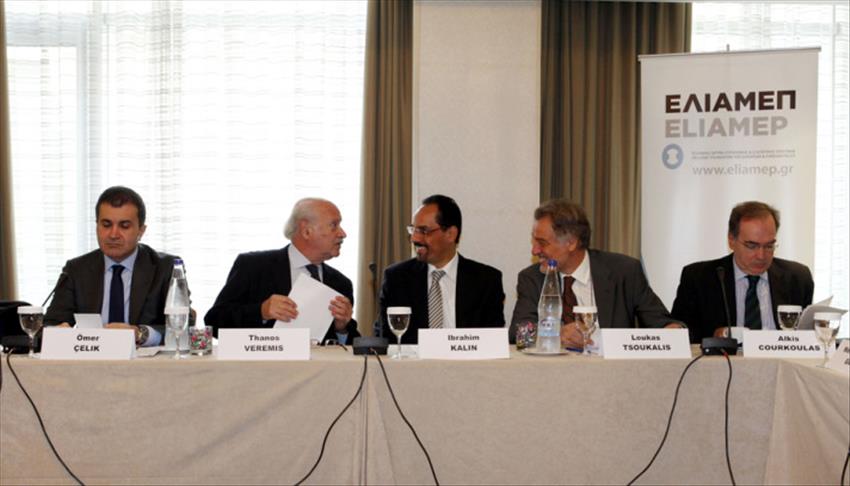Greece may announce its exclusive economic zone in Aegean, says director general of think-tank organization
Thanos Dokos, director general of a leading Greek think tank organization ELIAMEP, said on Friday that "Greece may announce its Exclusive Economic Zone (EEZ) in the Aegean due to domestic pressure.

Speaking to the Anadolu Agency (AA), Dokos stressed that the declaration of an EEZ would be the beginning of a long process.
If Greece does announce its EEZ, then I would hope that this would not lead to any tension with Turkey (in the Aegean), Dokos underlined.
The issue of EEZ has been the most debated one in Greece in the past few years.
Greek circles who want Greece to make use of natural energy sources in the Aegean in order to overcome the major economic crisis and want the announcement of an EEZ place heavy pressure on the government of Prime Minister Antonios Samaras.
One of the promises Samaras had made during his recent election campaign was the announcement of the EEZ.
Just recently, Greek Foreign Minister Dimitrios Avramopoulos stated that they sent clear messages to Turkey on the EEZ and were making both political and legal preparations on the issue.
Experts argue that it would be beneficial for Turkey and Greece to discuss the issue of the EEZ so as to facilitate the exploration of natural gas and oil in the Aegean Sea.
Experts also argue that the determination of an EEZ would require a long diplomatic process.
"The ordinary person in the street has to understand that, even if you declare an EEZ today, it does not imply that you can begin drilling for energy sources tomorrow. There is long legal process according to international laws. If a neighboring country does not recognize your EEZ, then bilateral talks and negotiations begin. If disagreement continues between two parties, they can take the issue to the International Court of Justice in the Hague. This process may take months or perhaps years," Dokos stated.
"Turkey and Greece will be successful in solving the problems in the Aegean," Dokos indicated.
"I am optimistic. There are problems in the Aegean for the past 50 years. There have been important crisis but since 2002 the diplomats of Turkey and Greece regularly hold consultation meetings. At least, we can now talk with each other. Only a few meetings were reflected in the media. There has been crucial progress in relations with Turkey. As soon as Greece overcomes its economic problems, it would begin focusing on foreign policy issues. The two sides in the Aegean will decide if they would take issues on which they do not mutually agree to the International Court of Justice in the Hague. Will we see a satisfactory result? We will see," Dokos also said.
-What is an EEZ?-
Generally, a state's EEZ extends to a distance of 200 nautical miles (370 km) out from its coastal baseline. The exception to this rule occurs when EEZs would overlap; that is, state coastal baselines are less than 400 nautical miles (740 km) apart. When an overlap occurs, it is up to the states to delineate the actual maritime boundary. Generally, any point within an overlapping area defaults to the nearest state.
A state's exclusive economic zone starts at the seaward edge of its territorial sea and extends outward to a distance of 200 nautical miles (370.4 km) from the baseline.
The EEZ stretches much further into sea than the territorial waters, which end at 12 NM (22 km) from the coastal baseline (if following the rules set out in the UN Convention on the Law of the Sea).
Thus, the EEZ includes the contiguous zone. States also have rights to the seabed of what is called the continental shelf up to 350 nautical miles (648 km) from the coastal baseline, beyond the EEZ, but such areas are not part of their EEZ. The legal definition of the continental shelf does not directly correspond to the geological meaning of the term, as it also includes the continental rise and slope, and the entire seabed within the EEZ.








